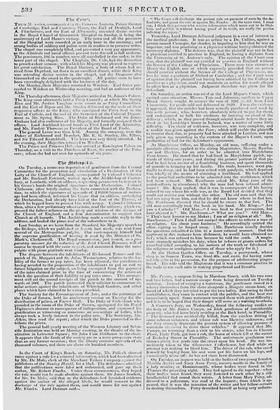In the Court of King's Bench, on Saturday, Mr. Polleck
showed cause against u rule for a criminal information, which had been obtained by Mr. He Mole, clerk of the Alerebant Tailors Company, egainst the publishers of the Sunday Herald, for a libel. The defendaels admit:ed that the publications were fal-e and unfoinided, and gave up their author, Mr. Robert Franks. Under these circumstances, they hoped the rule would not he made absolute against them. Sir James Scarlett, for Ale He Mole, said that as the defendant:, had furnished evidence against the ;author of the alleged libels, he would consent to the discharge of the rule against them, and would move for one against Mr. Franks. Lord Demnam said- " The Court a ill discharge the present rule inn payment of costs by the de- feudants, and grant the rule as against Mr. Franks. At the seine time I must
say, I think that persons who rcreive ieformatimewhich turns out to 'be lib:l-
imits. and It without having proof of its truth, are really the parties aenetseg the injury."
Yesterday, Lord Denman delivered judgment in a case of interest to the medical profession. It was an action by. a Dr. Collins, against a person named Carnegie, for slander, in imputing to him that he was tut impostor, trial was practising as u 'physician without having obtained the necessary diploma. The defence was, that the plaintiff was not in fact
a physician entitled to practise in England, he having a diploma from
the University of St. Andrew's only. The opinion of the Court now was, that the plaintiff was not entitled to practice in England vt-ithout
the licence of the College of Physicians. There were two statutes of Henry the Eighth, one of which expressly provided that no person should practice %vithout the licence of the College of Physicians, un-
less Ile were a graduate of Oxford or Cambridge ; and the Court were of opinion that the plaintiff Hot having been admitted by the College to practice.. as a physician, could not maintain an action for words alleged to affect him as a physician. Judgment therefore was given for the defendant.
On Saturday, an action was tried at the Lord Mayor's Court, which excited !-oine attention. Messrs. Tate and Johnston, suddlers in Upper
Brook Street, sought to recover the sum of 128/. td. from Lord Clanmorris, ler goods sold and delivered in 18-29. From the evidence it appeared, that the articles had been actually purchased and used by this eppete person ; who, however, absolutely refused to pay for them, aim' endeavoured to balk his creditors by insisting Oil proof of the delivery ; which, :IS they passed throtigh several hands befbre they ar- rived at his Lordship's house in Ireland, was a matter of some little difficulty. The chain of evidence, however, was very complete, and a verdict was given against the Peer; which will enable the plaintiffs to recover their due, as property had been attached in London, and was only given tip, according to the custom of the Mayor's Court, upon production of bail for the defendant's uppearance.
At liarylehone Office on Monday, an old man, suffering under a paralytic affection, applied to the sitting Magistrates, Messrs. Rawlin- son and Hoskins, for an order to be admitted into Alarylebone Poor-house. He stated that he had lived in Marylebone parish, up- wards of thirty-one years; and during the greater portion of that pe- riod he had been master of a flourishing business, and spent thousands of pounds in bringing up his family. His trade, however, went gra- dually to decay, and he had been seized with paralysis, which deprived him wholly of the means of obtaining a livelihood. He had applied to the parochial authorities to be admitted into the workhouse, which had been refused. Mr. Rawlinson asked Mr. King (one of the parish-oflicers in attendance) why the man had been refused admit- tance ? Mr. King replied, that it was in consequence of his having refused to any where his wife was, as the Board had decided that they could not receive one without the other. The old man said that she had rim away from him, and that he did not know where to find her. Air. Ilnwlitison directed that he should be sworn to that fact. The old man accordingly took the book in his hand. Mr. King—" Are you a Catholic?" Old Man—" I was bred to that persuasion, but have abjured it." Air. Itawlinson—" What are you?" Old Man— 'runt's best known to my 'Maker; I am of no religion at all." Mr. Rawlinvon—" Then I shall not compel the officers to relieve a man of no religion. Go about your business." He accordingly quitted the office, sighing as he limped away. 1 Mr. Rawlinson usually decides the questions submitted to him in a more rational manner. Had the applicant in this instance been dishonest, lie would have obtained ree lief; which was refused to him because he told the cruth. A magis- trate strangely mistakes his duty, when he refuses or grants orders for parochial relief according to his notions of the truth or falsehood of the religious or irreligious opinions of those who apply for it.] At the Hatton Garden Office, on Tuesday, a pastrycook, whose slump is in Somers Town, was fined 40s. and costs, for having some velitile salts in his possession, for the purpose of adulterating ginger- bread. His wife told the Magistrate that it was a cominon practice in the trade to use Still salts in making gingerbread and biscuits.






















 Previous page
Previous page